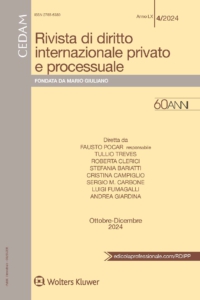Views
Cassirer on Remand: Considering the Laws of Other Interested States
This post is by Carlos Manuel Vázquez, a professor of law at Georgetown Law School. It is cross-posted at Transnational Litigation Blog.
Claude Cassirer brought suit in federal court in California eighteen years ago against the Thyssen Bornemisza Museum of Madrid, Spain, to recover a painting by Camille Pissarro that was stolen from his grandmother by the Nazis during World War II. After a reversal and remand from the U.S. Supreme Court last summer, the case is now before the Ninth Circuit for decision of the legal question that is likely to be decisive: which law governs?
The district court and the court of appeals have so far framed the issue as a binary choice: the governing law on the merits is either that of Spain or that of California. I suggest here that the issue is better framed as a choice between the law of Spain, on the one hand, and the laws of all the other states or countries with connections to the dispute, on the other. (Disclosure: I submitted expert declarations in support of the plaintiffs on issues of public international law during earlier phases of this case.)
The U.S. Court of Appeals for the Ninth Circuit has affirmed the district court’s holding that, under the law of Spain, the plaintiff loses because the museum acquired title to the painting through adverse possession (otherwise known as acquisitive prescription). It is equally clear that, under the law of California, the plaintiff would prevail because California does not recognize the acquisition of title to moveable property through adverse possession. What has so far not featured prominently in the courts’ analyses of the choice-of-law issue is that the plaintiff would also prevail under the laws of all the other jurisdictions that have relevant connections to the dispute. Under governmental interest analysis, this should be central to the analysis. Read more
Review of: PP Penasthika, Unravelling Choice of Law in International Commercial Contracts: Indonesia as an Illustrative Case Study (The Hague: Eleven Publishers 2022)

Very recently, Indonesian private international law has attracted significant scholarship in the English language.[1] Dr Penasthika’s monograph (‘the monograph’)[2] is one such work that deserves attention for its compelling and comprehensive account of choice of law in international commercial contracts in Indonesia. My review attempts to capture the methodology, summarise the contents, and give a verdict on the quality of this monograph.
Mbatha v. Cutting: Implications for Litigants of Indian Origin
Guest Post by Chytanya S. Agarwal*
I. Introduction
Rising cross-border migration of people and concomitant increase in lawsuits relating to matrimonial disputes between couples brings to the forefront the issue of conflict of jurisdictional laws (219th Law Commission Report, ¶1.1-¶1.2). Mbatha v. Cutting is one such recent case that grapples with conflict of laws pertaining to divorce and division of matrimonial property when the spouses are domiciled in separate jurisdictions. In this case, the Georgian Court of Appeal dealt with competing claims from a couple who married in New York and had their matrimonial domicile in South Africa. The wife, domiciled in Georgia, USA, argued for the application of the matrimonial property regime of South Africa – their only (though temporary) common matrimonial domicile. In determining the applicable law, the Court upheld the traditional approach, which favours lex situs for real property and lex domicilii for personal property.
News
Rivista di diritto internazionale privato e processuale (RDIPP) No 4/2024: Abstracts
 The fourth issue of 2024 of the Rivista di diritto internazionale privato e processuale (RDIPP, published by CEDAM) was just released. It features:
The fourth issue of 2024 of the Rivista di diritto internazionale privato e processuale (RDIPP, published by CEDAM) was just released. It features:
Francesca C. Villata, Professor at the University of Milan, On the Track of the Law Applicable to Preliminary Questions in EU Private International Law [in English]
Silenced, if not neglected, in (most) legislation and practice, the issue of determining the law applicable to preliminary questions is a constant feature in the systematics of private international law (“p.i.l.”).
ELI Extra-Judicial Administration of Justice: 14 February in Vienna
The European Law Institute (ELI) Extra-Judicial Administration of Justice in Cross-Border Family and Succession Matters project is organising its dissemination conference in Vienna on 14 February. At this all-day event (9.00 to 18.00) experts will present their country reports, comparative findings and policy recommendations, in order to discuss these with the audience.
The project investigated the phenomenon that family and succession law matters are increasingly submitted to other authorities than courts. It seeks a to establish a harmonised concept of “courts” in the EU, taking into account the CJEU case law.
More information and the registration form are available on the ELI website.
Virtual Workshop (in English) on February 4: Pietro Franzina on “EU Private International Law at a Time of ‘Broken Multilateralism’ and Growing Geo-Political Tensions”

On Tuesday, February 4, 2025, the Hamburg Max Planck Institute will host its monthly virtual workshop Current Research in Private International Law at 11:00 a.m. – 12:30 p.m. (CET). Professor Pietro Franzina (Catholic University of the Sacred Heart) will speak, in English, about the topic
“EU Private International Law at a Time of ‘Broken Multilateralism’ and Growing Geo-Political Tensions”
Multilateralism is in crisis. The role of world organisations in international politics and law-making is increasingly being questioned, as some key actors in the global arena no longer consider cooperation and collective action the best way to address common concerns. While multilateralism is not obsolete, let alone ‘dead’, as some claim, there is a growing consensus that current governance schemes need profound reconsideration. The EU, multilateralism’s staunchest defender, is especially exposed to these developments. While the evolution of multilateralism is set to affect all areas of international cooperation, each field has, arguably, its specificities. What features does cooperation in the field of private international law display in this regard? How can the crisis of multilateralism influence the way in which the EU deals with judicial cooperation, be it through its legislation, in the relations with its neighbours and at the global level? What structural changes are under way in global fora, such as the HCCH, and what is their impact on the EU’s own agenda and methods of work?
The presentation will be followed by open discussion. All are welcome. More information and sign-up here.
If you want to be invited to these events in the future, please write to veranstaltungen@mpipriv.de.


